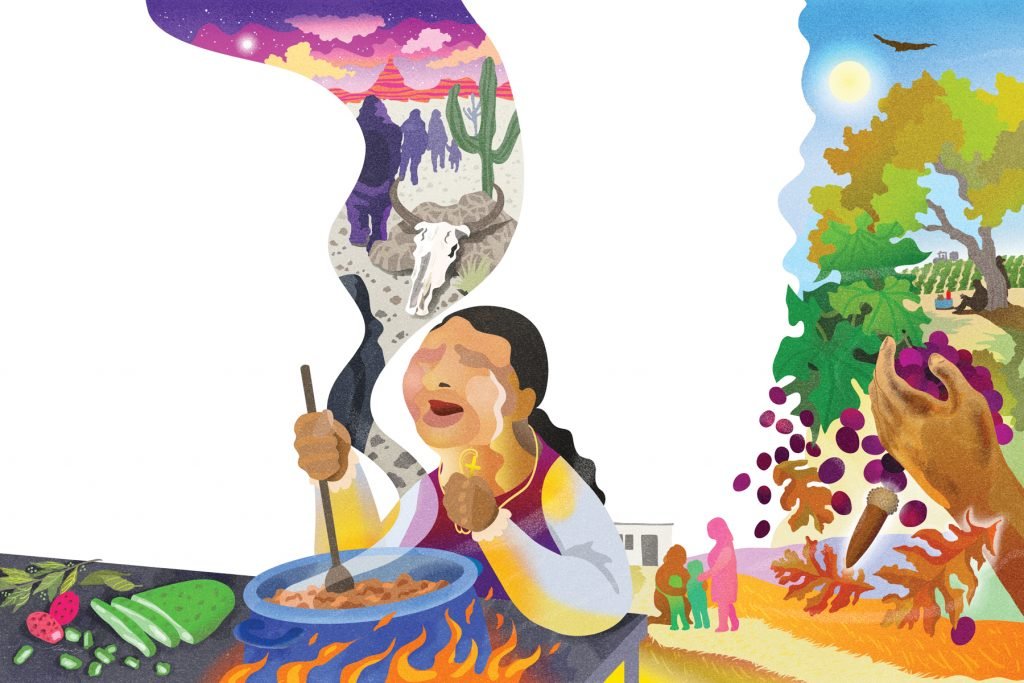
Undocumented
Transcribed from Spanish to English. Edited for brevity.
Editor’s note: According to the Public Policy Institute of California, California is home to 2.35-2.6 million undocumented immigrants, which is nearly 6 percent of the state’s population. California has more immigrants than any other state. And, nearly 1 in 10 California workers, or roughly 1.75 million people, is an undocumented immigrant. Mexican and Latino migrant laborers make up 80 percent of the workforce of the nation’s agriculture industry, which is the backbone of the U.S. economy. As for SLO County, an estimated 9,000 undocumented residents live and work here.
Nine years ago I said goodbye to my mom. I knew I wouldn’t see her again for a long, long time. She hugged me and cried, I cried too. That was the last time I remember crying. I haven’t seen my mom since that day.
I made the decision to leave my small hometown in Mexico, the only home I’d ever known, and my family — my mom, dad, two brothers and the many extended relatives who all lived on the same street as me. Some in the same house.
I knew I was poor but every person I knew growing up was poor too so it didn’t bother me. Seeing the houses here in America make me understand that I was living in a shack held together with chicken wire. I shared a bed with my two brothers.
But the worst part of growing up there was all the senseless killings. I remember as a young child my uncle refused to give up his pushcart to a bully who tried to take it from him, and a week later that same man kidnapped my cousin and threw her lifeless body on my uncle’s lawn.
From a young age, me, my brothers and my cousins have all been told by our parents that going to the United States meant a better life. It was expected that some of us would go. It’s like how American children are expected to go to college. For us, it was, “Go to America.” And this was our parents telling us this even though they knew the risks of trying to cross the border. And it meant they might not see their kids again.

When I was fed up enough and felt brave enough to leave, I met with a man introduced to me by a friend of our family’s. He helped their relatives cross the border.
I packed a backpack with a little food, a bottle of water, a calling card and another set of clothes, and piled into this man’s truck. He drove me and 14 other people 10 miles away from the border. After getting out of his truck, I never saw him again. There was very little communication. I just followed the group.
Some other man came to lead us on foot. We crossed through Arizona and walked through the desert for more than a week, finding a place to hide and sleep during the day and moving only at night. … I remember it was unbearably hot. I was a strong 16-year-old boy. I don’t know how young kids make it through those dangerous conditions.
We were led to a bus station and there I called the only person in America that I knew to reach out to. My cousin had a friend who moved to the U.S. too — he lived in California. He was expecting my call. I got on a long bus ride to his place. He let me stay on his couch; he was living in San Miguel at the time. For us immigrants, that’s what we do for one another. We let each other stay at our places with no time limit. And we help each other find jobs.
I was told the easiest part about moving to America would be finding a job. That was true. It was very easy. There are so many opportunities to work on vineyards, farms, in restaurants. I’ve only changed jobs twice since moving here nine years ago and both times I’ve worked on vineyards. There’s a nonstop need for help in the field. Just in the San Miguel, Paso Robles, Templeton areas, I am guessing there are hundreds of people just like me, working harder than anyone. My co-workers and I joke that if Americans are worried about us taking jobs from them, how come we don’t see them in the fields with us? Why aren’t they applying for these jobs? It’s tiring work.
I’ve been here for nine years and all of my friends are Mexican, and my bosses have always been white. I am grateful my bosses speak Spanish with me. It makes me miss home less. I know some English but am too embarrassed to speak it. I’ve been learning.
Five years ago I met a woman who is now my loving wife. She was born in the U.S. Together we have two young kids. I go to a lawyer that works with people like me who don’t have papers. He helped set us up with a tax ID number. We pay taxes. We help this area grow. We work hard. But every day I still live with fear that I will get kicked out of the country.
My wife and my kids are American citizens so they traveled to Mexico once to visit my family, without me. I can never go back. Not now at least. Not until I become an American citizen. If I go, I don’t know if I can re-enter the U.S. My wife said my mom hugged her and cried for two hours. And she wouldn’t let go of her grandkids. I’m glad that my kids could meet my mom and experience her hugs.

